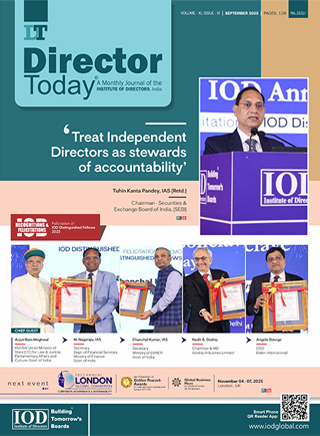Corporate Governance in India

Charting a New Future: Embracing Sustainability, Cyber - Resilience, and Innovation
Insights from the Institute of Directors, India
The corporate governance landscape in India has undergone a remarkable transformation in recent years. This evolution, driven by significant regulatory reforms, the growing importance of sustainability, and the adoption of cutting-edge technologies, has redefined the role of Indian boardrooms.
Today, boards in India are no longer limited to ensuring compliance; they are actively shaping a future where governance is intertwined with Environmental, Social, and Governance (ESG) principles, digital transformation, and climate action. As Indian companies increasingly adopt these elements, the foundation of corporate governance is transforming to support a more sustainable, ethical, and globally competitive business environment.
Ethos extends beyond simply ensuring regulatory compliance. It involves creating a corporate culture that embodies integrity, fosters trust, and encourages ethical decision-making.
The Institute of Directors (IOD), India, is at the forefront of supporting the boardroom community with a comprehensive suite of services. Through its Membership services, Training workshops for directors & senior executives, Golden Peacock Awards, Publications, Events for networking, and Board Advisory services, IOD provides a 360-degree service to directors, fostering better governance practices and helping them navigate the complexities of the modern corporate world. With these offerings, IOD plays a pivotal role in enhancing boardroom effectiveness and shaping the future of corporate governance in India.
Strengthening the Regulatory Framework
India's regulatory landscape has steadily matured, aligning with global best practices while addressing unique national challenges. A cornerstone of this evolution is the Companies Act, 2013, which set the stage for enhanced corporate governance standards by mandating the appointment of independent directors, instituting audit committees, and enforcing rigorous transparency protocols.
The Securities and Exchange Board of India (SEBI) has played a pivotal role in elevating governance standards through its Listing Obligations and Disclosure Requirements (LODR) Regulations, 2015. These regulations have compelled companies to publish detailed reports on board processes, business strategies, and sustainability measures, resulting in a heightened focus on transparency that aligns with international governance norms.
Indian boardrooms are evolving into strategic hubs that balance compliance, stakeholder value, and long-term sustainability.
India's corporate governance framework is deeply rooted in the insights and recommendations of several high-level committees over the years. The Kumar Mangalam Birla Committee (1999) laid the foundational principles for good governance practices, while the Naresh Chandra Committee (2002) and the J. J. Irani Committee (2005) refined these norms by emphasizing the roles of auditors, board independence, and shareholder rights. More recently, the Kotak Committee (2017) introduced modern governance standards, enhancing both transparency and the effectiveness of board oversight.
The Institute of Directors (IOD) has played a key role in advancing these principles. Notably, the Late Mr. Madhav Mehra, Founder of IOD, India, contributed significantly to global governance dialogues, including discussions with Late Mr. Adrian Cadbury, helping to shape the course of corporate governance for Indian businesses.
Collectively, these efforts have fortified the foundations of corporate governance in India, ensuring that companies operate with integrity and accountability, while remaining aligned with international best practices.
Culture as a Pillar of Corporate Governance
Corporate Governance is more than frameworks and regulations. Culture-both in boardrooms and throughout organizations-plays an equally critical role in shaping outcomes. Board members-Executive, Non-Executive, Independent, and Nominee Directors-must not only ensure compliance but also act as stewards of the company's culture. When boards create and foster an environment where transparency, accountability, and respect are foundational, they set the tone for the entire organization. How an organization navigates its internal dynamics speaks volumes. Recent corporate scenarios have highlighted that lapses in ethical culture can compromise even the most robust governance structures. Ultimately, the human element-how individuals are treated, respected, and valued-can define a company's long-term success or failure.
Corporate governance is more than just frameworks and regulations; it is deeply influenced by the culture within boardrooms and across the organization. Beyond compliance, directors serve as stewards of an organization's culture. By fostering an environment built on transparency, accountability, and respect, Boards shape the organization's value system, which is broader than just its Culture. Values act as the foundation, guiding behaviours and decision-making at every level. Recent corporate events have demonstrated that lapses in ethical culture can undermine even the most rigorous governance structures.
As Mr. G. Mahalingam, Independent Director on multiple boards and former Whole-Time Member of SEBI, eloquently stated:
"Being a director means examining all sides of a strategic proposal. An independent director is not just a member of a board; he is like an umpire in a sports match or a judge of the management's ethical conduct."
This ethos extends beyond simply ensuring regulatory compliance. It involves creating a corporate culture that embodies integrity, fosters trust, and encourages ethical decision-making.
In IOD's recent webinar, a thought-provoking question was raised:
What is the most crucial aspect of due diligence when accepting an Independent Director position?
The responses were foreseeable, with 'Board & Governance' ranking as the top priority, followed by 'Culture'. This highlights the growing recognition that culture is not just a soft factor-it is central to effective governance.
Board Evaluation: A Trend on the Rise
In addition to Culture, another vital trend in corporate governance is Board Evaluation. Increasingly, corporate boards are voluntarily adopting the practice of engaging external agencies for board evaluations. It demonstrates transparency and instils confidence in stakeholders, ensuring that the board's performance has been objectively scrutinized. A recent PwC study found that 79% of directors believe that board evaluations are essential for enhancing board effectiveness, with an increasing number recognizing the value of external, independent evaluations. This growing trend shows that boards are moving beyond internal assessments and seeking external validation to ensure accountability and continuous improvement. It can be said, board evaluations are no longer just a regulatory checkbox but a powerful tool for building trust and ensuring the highest governance standards.
Board Composition and Oversight: Embracing Cognitive & Gender Diversity
The composition of Indian boards has seen significant progress, with a growing focus on both cognitive and gender diversity. SEBI's mandate for at least one woman director has advanced gender representation, but boards are increasingly prioritizing a broader mix of skills and experiences. Diverse boards, with a range of perspectives, are better equipped to tackle complex challenges, foster innovation, and ensure that decision making aligns with long-term strategic goals.
While gender diversity has improved-women now hold 18.2% of board seats across NIFTY 500 companies-there is still room for growth compared to global benchmarks. However, diversity is not limited to gender. Cognitive diversity, which includes a variety of industry, regulatory, and sustainability expertise, is equally crucial.
Interestingly, a PwC study found that only 28% of executives believe their boards possess the right combination of skills and expertise. In addition, a McKinsey report highlights a couple more reasons why boards may not be fully prepared for emerging challenges:

• Digital Disruption: Many boards lack sufficient understanding of digital and technological shifts that are rapidly transforming industries. This makes it difficult for them to provide strategic oversight, as directors may not be familiar with digital tools and the cyber risks that come with them. The fast pace of technological advancement requires continuous upskilling of boards, which many have yet to prioritize adequately.
• Short-term Focus: Some boards still prioritize short term financial performance over long-term strategic growth, which can hamper their ability to guide companies through longer-term challenges such as sustainability and innovation.
While executives emphasize the need for knowledge in areas like industry trends, regulations, and sustainability, directors often prioritize traditional strengths such as finance, risk management, and operations. This skills gap reveals an evolving agenda for Indian boards, underscoring the need to expand their expertise to address the growing complexities of modern corporate governance.
The Rise of ESG & Sustainability
The shift towards sustainability and ESG integration is becoming essential in modern Indian boardrooms. SEBI's Business Responsibility and Sustainability Report (BRSR) framework has redirected attention from merely financial performance to a comprehensive assessment of a company's societal and environmental impact.
India's commitment to global climate accords, such as the Paris Agreement, underscores the urgent need for boardrooms to act decisively on climate change. Today, Indian firms are mandated to disclose detailed ESG practices, including carbon footprints and resource efficiency. Notably, Infosys has achieved net-zero emissions, while Reliance Industries aims to become a net zero carbon emitter by 2035, a testament to how climate action is now part of corporate India's core strategy.
Sustainability has evolved from being an 'optional corporate responsibility' to a 'strategic priority' aligned with long-term business objectives. This trend is evident across sectors, with industries like manufacturing, energy, and IT making substantial investments in renewable energy, green technologies, and sustainable practices.
Digital Transformation and Technology in Governance
The rapid adoption of AI, big data, and digital tools is reshaping corporate governance in India. Boardrooms are now responsible not only for traditional financial oversight but also for managing emerging areas like data governance, cybersecurity, and digital ethics. AI is revolutionizing decision-making, enhancing operational efficiency, and improving customer experiences. However, these advancements also increase the risk of cyber threats, making it critical for boards to implement robust security measures and risk management strategies.
SEBI's stringent regulations on cybersecurity have accelerated efforts by Indian companies to strengthen their data protection frameworks. This aligns with a broader global trend, where boards are increasingly tasked with overseeing technology-related risks and ensuring compliance with evolving digital regulations.
The financial implications of data breaches are a growing concern. In India, the average cost of a data breach was $2.18 million in 2023, according to an RBI report. Globally, this cost is projected to soar to $13.82 trillion by 2028, with phishing and credential theft being the most prevalent attack methods.
In this digital age, corporate boards must now go beyond traditional 'financial oversight' to include 'technology oversight', ensuring that their organizations remain compliant with digital regulations while mitigating the risks associated with cyber threats.
Enhancing Ease of Doing Business: A Testament to Governance Reforms
India's remarkable improvement in the World Bank's Ease rd of Doing Business rankings, currently positioned at 63rd out of 190 countries, underscores the impact of strategic governance reforms. Back in 2014, India was ranked 142nd, meaning the country made an impressive leap of 79 places in just six years. Transformational initiatives like the Insolvency and Bankruptcy Code (IBC) and the introduction of the Goods and Services Tax (GST) have been pivotal in simplifying business processes, enhancing transparency, and improving operational efficiency. These reforms reflect a governance framework that not only eases operations but also strengthens accountability, fostering a more conducive and competitive business environment in India.

Optimism and Corporate Governance Growth in India
According to a PwC Annual Global CEO Survey - India Perspective for 2024, there is distinct optimism among Indian CEOs about the economic future. The survey revealed that 86% of Indian CEOs believe their economy will improve. This sentiment was reinforced at the 2024 Davos World Economic Forum, where India was spotlighted as one of the fastest-growing major economies. It was noted that India is at a pivotal point in its economic trajectory. This optimism reflects a broader sense of faith in India's evolving corporate governance framework, particularly its ability to foster sustainable growth in challenging global environments. Indian companies have shown resilience and adaptability, supported by a governance ecosystem that prioritizes transparency, accountability, and long-term value creation.
The Road Ahead: Adapting to Global Headwinds
Indian boardrooms must adapt to global headwinds like the lingering effects of COVID-19, geopolitical tensions, and economic uncertainties. Strengthening supply chain diversification, embracing ESG frameworks, and investing in technology will be key to ensuring long-term growth and resilience.
Conclusion: Shaping the Future of Corporate Governance in India
The modern corporate governance landscape in Indian boardrooms is dynamic and forward-thinking. As Indian companies continue to align with global standards, focus on transparency, sustainability, and digital transformation, Indian boardrooms are evolving into strategic hubs that balance compliance, stakeholder value, and long-term sustainability.
The future of corporate governance in India lies in its ability to:
• Strengthen regulatory compliance,
• Foster sustainability and ESG integration,
• Embrace digital transformation and innovation,
• Enhance board diversity and oversight.
Author

CS Sana Rehman
She is the Executive Editor of Director Today magazine. She is also the Assistant General Manager - Board Research & Advisory at the Institute of Directors, India.
Owned by: Institute of Directors, India
Disclaimer: The opinions expressed in the articles/ stories are the personal opinions of the author. IOD/ Editor is not responsible for the accuracy, completeness, suitability, or validity of any information in those articles. The information, facts or opinions expressed in the articles/ speeches do not reflect the views of IOD/ Editor and IOD/ Editor does not assume any responsibility or liability for the same.

 Quick Links
Quick Links
 Connect us
Connect us




 Back to Home
Back to Home































